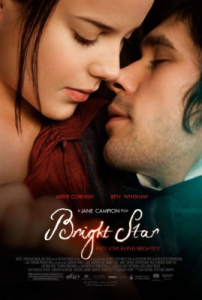 Bright star, would I were stedfast as thou art–//Not in lone splendour hung aloft the night//And watching, with eternal lids apart//Like nature’s patient, sleepless Eremite//The moving waters at their priestlike task//Of pure ablution round earth’s human shores//Or gazing on the new soft-fallen mask//Of snow upon the mountains and the moors–//No–yet still stedfast, still unchangeable//Pillow’d upon my fair love’s ripening breast//To feel for ever its soft fall and swell//Awake for ever in a sweet unrest//Still, still to hear her tender-taken breath//And so live ever–or else swoon to death. – John Keats (1819)
Bright star, would I were stedfast as thou art–//Not in lone splendour hung aloft the night//And watching, with eternal lids apart//Like nature’s patient, sleepless Eremite//The moving waters at their priestlike task//Of pure ablution round earth’s human shores//Or gazing on the new soft-fallen mask//Of snow upon the mountains and the moors–//No–yet still stedfast, still unchangeable//Pillow’d upon my fair love’s ripening breast//To feel for ever its soft fall and swell//Awake for ever in a sweet unrest//Still, still to hear her tender-taken breath//And so live ever–or else swoon to death. – John Keats (1819)
Okay, so here’s the deal: If you like/understand/are intrigued by the above poem, appreciate romantic poetry, or consider yourself a hapless or hopeless romantic, then you’ll probably enjoy this film. If you went – “huh?” or “duh” or “whatever”, then chances are you’ll want to skip it regardless of the reviews.
Bright Star is a romantic drama based on the intense, yet ill-fated love affair between 19th Century romantic poet John Keats (Ben Whishaw) and his muse, the intriguing seamstress-next-door, Fanny Brawne (Abbie Cornish). It’s a romance that proved greatly inhibited by the financial and social boundaries that defined their times. The film is rated PG, so you can probably guess that there’s no big screen consummation of their affair. Just a collection of glances, soft touches and love letters that evoke the passion – both realized and unfulfilled – between these star-crossed lovers. I don’t think I’m spoiling anything by revealing that Keats died of tuberculosis at the tender age of 25. So there’s no happily-ever-after here.
The movie is beautifully shot – full of vibrant colors and sweeping landscapes that appeal to the inner poet in all of us (kudos to cinematographer Greig Fraser). Writer/director Jane Campion (The Piano) succeeds in bringing a little known, yet poignant love story to the big screen, but there’s definitely something missing. I’m not even sure what it is — that special ingredient that transforms an okay romantic drama into an unforgettable romantic drama. This one’s just okay.
There is some fine ensemble acting in Bright Star (particularly from Paul Schneider as Keats’ best friend and fellow poet, Charles Armitage Brown and from young Edie Martin as Brawne’s little sister, Toots). It could even garner an Oscar nod or two (as epic period pieces tend to do), but I will be most surprised if it breaks into the mainstream with any real success. The film moves rather slowly and quietly (some might say, boringly) and the very authentic British and Scottish accents can frustrate the untrained ear (i.e. mine). Needless to say, I probably missed a fair amount of dialogue.
Now, read the poem again. If you like it, consider adding Bright Star to your Netflix queue, or waiting for a review from Arty Chick. I don’t think it will be in theaters very long after its September 18th (limited) release date – not when it has to compete with a slew of other Oscar contenders and the likes of George Clooney and Matt Damon.

I am not sure you have to be a lover of the Romantic Poets to like Bright Star. I have never been particularly fond of poetry but I thought it was a wonderful film both for the imagery as well as the acting. And the story while not a bodice-ripping romance was very affecting to me.
Perhaps you do need to be a fan of 19th century time period though – Jane Austen’s mileau – where romance was an oblique glance, a furtive touch. But also where lovers from different stations in life were doomed from the start, even though you hope against hope that it might work this time.
If you’re looking for a grand romance on the order of Gone with the Wind, this will disappoint you. But if you appreciate understated, repressed romanticism, this is a movie you should see. And see it in a theater because the cinematography is beautiful.
Mainstream Chick failed to mention that there are some very funny bits in the film, too. It isn’t a total downer movie. Many of the funny moments come from little sister Toots who has a great face and delivers lines with perfect innocence.
Bright Star is not really about Keats. Writer/Director Jane Campion mostly makes female-centric films and this one is centered on Fanny Brawne. Yes, it is about her romance with Keats, but it is through her eyes, her take.
I agree with Mainstream Chick though about a couple of points; I did miss some of the dialogue due to the accents. And it is not a story that moves at breakneck speed. But that was part of what I really liked about it. This is the kind of romance I enjoy; it is there below the surface. And you don’t have to be a poetry lover to get it.
Loved loved loved this film — beautifully photographed and acted. Abbie Cornish is fantastic– I hope she is nominated for her work in this— really recommend this film even though I cried all through the ending